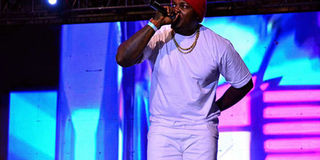From ‘Kolona Vilus’ to Sakaja’s rap: the viral music of our times

Kenyan rapper Khaligraph Jones. He has also released a corona-themed song. PHOTO | FILE | NATION MEDIA GROUP
What you need to know:
- African musicians have risen to the occasion, not for self-interest, but to entertain and inform their fellow citizens about this simple fact: stay safe.
- I find all the carping about the allocation president recently made to artistes distasteful. These people have to eat, and without financial help, they too will starve.
A few weeks ago, Kenyans who frequent social media were thrilled by a video clip featuring Nairobi Senator Johnson Sakaja and his two sons delivering a passionate rap on how people should protect themselves from coronavirus.
In itself, it was not great music; its appeal was derived from the rapper’s status and the tender ages of his collaborators.
It was also in the simplicity and timeliness of the message itself. Indeed, the rap could have delivered the message more efficaciously than the daily exhortations we are used to.
The senator is not the only one in Kenya who has seen the need to deliver a similar message.
Many other singers in the country — and the rest of the world — have delved into the subject, indicating clearly that during times of great adversity, they have seen a need to sensitise the people on how to keep themselves and their loved ones alive.
One would hope that this has not been prompted by any commercial considerations because toying with the idea of capitalising on such a cataclysm would be unthinkable.
INSPIRING EFFORTS
I am not too sure about this, but I believe the first musician in Kenya to recognise the enormity of what may come close to overwhelming us is a chap known as DannyP Mboka, with his song "Kolona Vilus", which was released early last month.
With its catchy but entirely forgettable tune, the young singer set the trend for what was to follow - musicians pleading for God’s intervention while at the same time urging people to take simple precautions.
Others who followed included Jimmy Gait, Timothy Kitui, Fanny Kerubo, Caxton Mutambuki, Khaligraph Jones, Muigai wa Njoroge.
There are also those who have released dance videos on the pandemic that have gone viral (pardon the expression) on YouTube and other music streaming sites.
However, the speed with which these compositions were released means that their appeal is unlikely to outlast the pandemic.
In the rest of Africa, the most inspiring effort in this regard is, to me, the contribution by President George Weah of Liberia.
In his song, "Let Us Stand Together and Fight Coronavirus", the former international football star-turned-politician used his gravel voice (he reminds me of Louis ‘Satchmo’ Armstrong in his heyday) to rally Liberians to the cause, something he has reportedly done before during the country’s eight-year civil war in the 1990s.
RISEN TO OCCASION
Closer home, Uganda’s firebrand politician Robert Kyagulanyi, aka Bobi Wine, has also released a reggae-themed song, "Corona Virus Alert", which shows a lot more creativity than Weah’s and which must be giving his nemesis, President Yoweri Museveni, sleepless nights because of its appeal.
This must be most galling considering that Museveni regards himself to be a rapper of note, having released a rambling political ‘hit’ — "You Want Another Rap?" — back in 2010 while campaigning for another presidential term.
Away from our good neighbours, other notable African musicians who have lent their voice to the anti-coronavirus awareness campaign include Senegalese star Youssou N’Dour, DRC’s Fally Ipupa, Tanzania’s Rayvanny, and the lady who graciously lent me her ringtone, Maua Sama.
Obviously, this list is not exhaustive but it will suffice as an illustration of my theme — that African musicians have risen to the occasion, not for self-interest, but to entertain and inform their fellow citizens about this simple fact: to safeguard your lives and those of your loved ones and to prevent Covid-19 spreading, stay at home, keep your distance, wash your hands all the time, sanitise them, wear a mask if you must go out, and if you suspect you have the virus, isolate yourself and get tested.
VITAL MESSAGES
The rest of the world has not been left behind. According to an article I read, right now, there are more than 500 songs on the virus in the media streaming service Spotify, and hundreds more are expected.
I understand some of the more popular songs on this platform are golden oldies with ominous titles like "Don’t Stand So Close to Me", "It’s the End of The World", "Staying Alive", "U Can’t Touch This" and "You Sound Like You’re Sick".
The proliferation of corona-themed songs has a simple cause. During times of such calamities, they have a duty to humanity — not only to entertain a population that is craving for any sort of diversion from the tedium of lockdown, but also to disseminate vital messages of self-preservation.
In history, it has happened during times of devastating pandemics like the great bubonic plagues that periodically ravaged humanity and halved populations since pre-historic times.
LIVELIHOOD
However, artists in general are living at a time when they cannot make a decent living.
Live performances are the life-blood of musicians, comedians and thespians, and without a paying audience, their pickings are slim.
If they do not get support at times like this, their art will atrophy and die.
This is why I find all the carping about the allocation President Uhuru Kenyatta recently made to artistes distasteful. These people have to eat, and without financial help, they too will starve.
Mr Ngwiri is consultant editor; [email protected]





